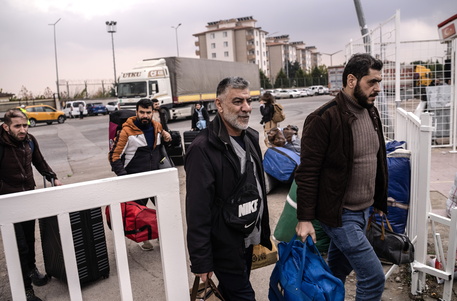(ANSA) - ROME, DEC 13 - Following the collapse of the Assad
regime in Syria, several European countries suspended asylum
decisions for Syrian citizens. How are the EU authorities
reacting to this development, and will they decide to establish
diplomatic relations with the group that says it is in charge
now but is currently subject to EU sanctions?
New circumstances.
Several European countries stopped processing asylum
applications from Syrian citizens following the new
circumstances created by the fall of the regime of Bashar
al-Assad, although the situation in the country remains
uncertain and tense.
Islamist rebels from the Hayʼat Tahrir al-Sham (HTS) group
launched an offensive against government troops in late
November. Last weekend the HTS and its allies swept into the
capital Damascus, ending more than five decades of brutal rule
by the Assad family. Bashar al-Assad took over as president of
Syria in 2000 after the death of his father Hafiz Assad, who had
ruled the country since 1971.
The collapse of Assad clan's half-century regime follows a
thirteen-year civil war sparked by a brutal crackdown on
pro-democracy protests. The conflict cost more than 500,000
lives and forced half of the country's pre-war population of 23
million people to flee their homes, many millions of them
abroad.
According to the United Nations High Commissioner for Refugees
(UNHCR) data, displaced Syrians have requested asylum in more
than 130 countries around the world, although the vast majority
live in neighbouring countries within the region: Lebanon,
Jordan, Iraq, Egypt and especially Türkiye, where there are
about three million Syrians.
Figures released on Wednesday by the European Union Agency for
Asylum (EUAA) show that more than 100,000 asylum applications
from Syrian citizens were pending across the EU at the end of
October, with applications frozen in multiple member states
following the fall of Assad.
EU countries suspend Syrian asylum
Although Europe is not the main destination for displaced
Syrians, there are countries that have been hosting these
nationals for years, such as Germany, where they arrived en
masse in the middle of the last decade, reaching almost one
million.
Germany's decision to pause asylum proceedings affects more than
the 47,000 people from Syria in Germany. In their applications
the civil war and current political situation in Syria would be
major factors in deciding whether the applicants should receive
asylum or not, according to a spokesperson of the Federal Office
for Migration and Refugees (BAMF).
A deputy spokesperson for the Interior Ministry, Sonja Kock,
indicated that "there is the possibility of lowering the
priority of asylum decisions", an option that the BAMF can
resort to in unclear situations, such as the current one in
Syria. It means that asylum decisions are not resolved but are
placed back at the bottom of the pile and other asylum decisions
are prioritized, she said.
For its part, the French government has followed other European
countries in deciding to freeze the asylum process. "We have
decided to adopt a measure inspired by the German one,"
confirmed a source from the French Foreign Office.
The Italian government also joined the countries suspending
asylum applications late on Monday.
Countries such as Austria (almost 15,000 applicants according to
UNHCR data for 2024) and non-EU member Switzerland (just under
500) have also frozen applications in light of the new
developments. Switzerland receives several hundred asylum
applications from Syrian citizens every year, with 2015 being
the year in which these reached their highest number, exceeding
4,700.
Belgium (more than 4,000 applicants) has also suspended the
processing of asylum applications from Syrians. The country's
authorities want more clarity on the future course of Syria and
the risks for possible returns to the country. "Refugee status
is not necessarily forever. If the situation in Syria improves
sustainably, I will ask the CGRS (the service responsible for
processing applications) to review the refugee status of Syrians
who arrived here in the last five years," said Secretary of
State for Asylum and Migration Nicole de Moor.
In the Netherlands the cabinet is imposing a six-month decision
freeze on asylum applications from Syrians. This was announced
by Minister of Asylum and Migration Marjolein Faber in a letter
to the House of Representatives. Syrians whose applications are
rejected will not be sent back.
On Tuesday, the immigration authorities of Finland, Sweden,
Denmark and non-EU member Norway have joined other European
countries and have announced that they are stopping the
processing of asylum applications from Syrian citizens, in
response to the overthrow of the authoritarian regime of Bashar
al-Assad.
Denmark's Social Democratic Prime Minister Mette Frederiksen,
who politically belongs to the S&D group, but often stands alone
among European Social Democrats with her stance on immigration
policy, expects Syrians to return home to rebuild their country
after the fall of Assad's regime."If I was forced to flee
Denmark, I would have a burning desire to return. This is my
country, my language and where my family has lived for
generations," said Frederiksen.
(continues).
(The content is based on news by agencies participating in the
enr, in this case AFP, ANP, ANSA, Belga, BTA, CTK, dpa, EFE,
Europa Press, Lusa, STA, Tanjug). (ANSA).
European countries put Syrian asylum applications on hold
Assad regime collapses
